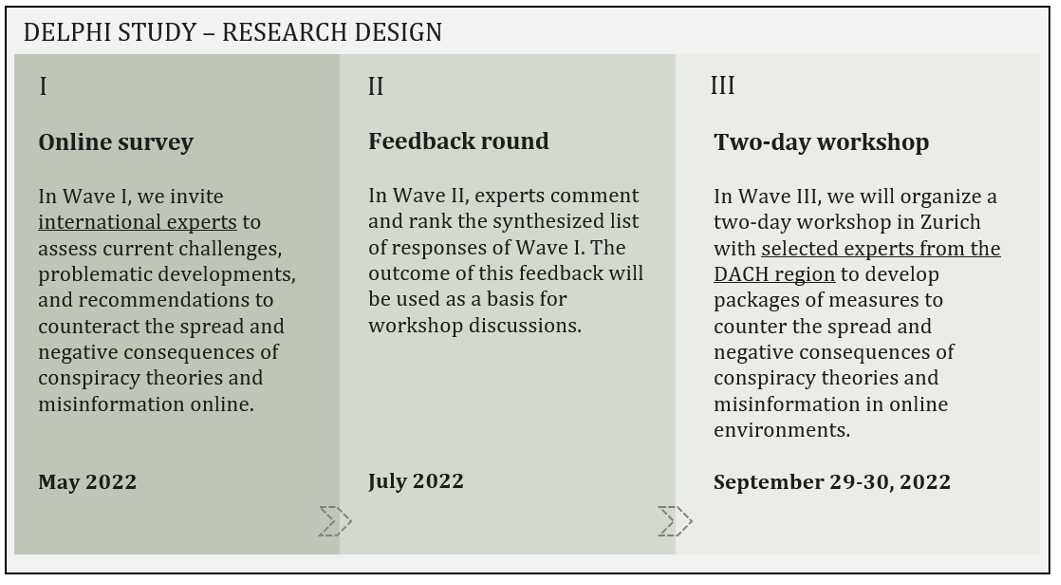Misinformation and conspiracy theories in online environments: A Delphi study to assess current challenges, problematic developments, and future recommendations
Aim and relevance of our study
Misinformation and conspiracy theories have received a significant boost during the COVID-19 pandemic. But also beyond the pandemic, misinformation and conspiracy theories abound in debates about the Russian invasion of Ukraine, the "Gilets jaunes" movement in France, the UK referendum to leave the European Union (“Brexit”), the presidential election and politics of Donald Trump, or emerging populist movements.
The spread of and belief in conspiracy theories and misinformation can have detrimental effects on individuals, communities, and societies, on public health, trust in science, support for authorities or for the democratic systems, and on social cohesion more generally. Against this backdrop, it is essential to
- assess the key challenges we are currently facing with regards to misinformation and conspiracy theories online,
- identify problematic developments we will encounter in the future, and
- developed strategies to effectively counteract conspiracy theories and misinformation online.
Research design
Given the complexity of these issues and the fact that a broad range of experts from different scientific disciplines, politics, tech platforms, journalism, and other fields are concerned with misinformation and conspiracy theories online, we decided to conduct a Delphi study - a technique that invites experts to assess, forecast, and evaluate certain developments.
Accordingly, we invite experts who are experienced in the field of misinformation and/or conspiracy theories, digital communication, regulation of information environments, and/or digital media literacy. We try to integrate a broad range of perspectives, inviting scholars from different disciplines, national backgrounds, and status groups as well as practitioners from politics, legacy media, tech companies, or NGOs.
Our Delphi study is split into three waves. To grasp the topic in all its facets, the first two waves will be conducted with international experts. In the last wave, we will focus specifically on the German-speaking region and invite experts from the DACH region to develop concrete countermeasures to curb conspiracy theories and misinformation.

The two-day workshop aims to discuss and elaborate prior results and formulate recommendations for measures to combat conspiracy theories and misinformation. After the first workshop session (September 29, 1pm to 5pm), we planned a panel discussion on “Fake News und Verschwörungstheorien – Learnings für die Zukunft» and award ceremony of Prix Média from 6 pm to 8 pm at Karl der Grosse in Zurich followed by an Apéro riche. The second workshop session (September 30, from 9am to 1pm) is followed by a joint lunch. The workshop will be in German. All travel and accommodation costs will be covered for the participants.
Funding and data privacy
This project is funded by the Swiss National Science Foundation (SNSF) as part of the project Science-related conspiracy theories online: Mapping their characteristics, prevalence and distribution internationally and developing contextualized counter-strategies and by the Swiss Young Academy (SYA) within the project What can we learn from COVID-19 fake news about the spread of scientific misinformation in general?.
All data will be processed, stored, and shared in accordance with the European Data Protection Regulation (data privacy statement can be found here (PDF, 104 KB)). The names of the participants or information by which they would be identifiable will not be published without their consent. The information gathered will be used for the purposes of the study report, academic dissemination, and as a basis for future guidelines and recommendations on best practices. Results will be published in peer-reviewed academic journals and reports for public consumption.
Project Team
The study is conducted by an interdisciplinary team consisting of researchers from the Department of Communication and Media Research (IKMZ) at the University of Zurich and the Swiss Young Academy (SYA) – a network of young researchers from a wide range of scientific disciplines.

Daniela Mahl (UZH), Dr. Sabrina H. Kessler (UZH, SYA), Prof. Dr. Mike S. Schäfer (UZH), Dr. Jing Zeng (UZH), Dr. Anna Jobin (Alexander von Humboldt Institute for Internet and Society (HIIG), SYA), Dr. Fanny Georgi (UZH, SYA)